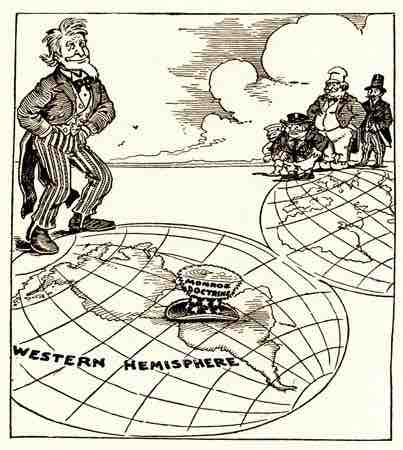Open Door Policy
The "Open Door Policy" refers to a U.S. doctrine established in the late nineteenth century and the early twentieth century, as expressed in Secretary of State John Hay's "Open Door Note," dated September 6, 1899, and dispatched to the major European powers. The policy proposed to keep China open to trade with all countries on an equal basis, keeping any one power from total control of the country, and calling upon all powers, within their spheres of influence, to refrain from interfering with any treaty port or any vested interest, to permit Chinese authorities to collect tariffs on an equal basis, and to show no favors to their own nationals in the matter of harbor dues or railroad charges.
The Open Door policy was rooted in the desire of U.S. businesses to trade with Chinese markets, though the policy's pledging to protect China's sovereignty and territorial integrity from partition also tapped the deep-seated sympathies of those who opposed imperialism. In practice, the policy had little legal standing; it was mainly used to mediate competing interests of the colonial powers without much meaningful input from the Chinese, which created lingering resentment and caused it to be seen later as a symbol of national humiliation by many Chinese historians.
Formation of the Policy
During the First Sino-Japanese War in 1895, China faced an imminent threat of being partitioned and colonized by imperialist powers such as Britain, France, Russia, Japan, and Germany. After winning the Spanish-American War of 1898, and with the newly acquired territory of the Philippine Islands, the United States increased its Asian presence and was expecting to further its commercial and political interest in China. The United States felt threatened by other powers' much larger spheres of influence in China and worried that it might lose access to the Chinese market should the country be partitioned.
As a response, William Woodville Rockhill formulated the Open Door Policy to safeguard American business opportunities and other interests in China. On September 6, 1899, U.S. Secretary of State John Hay sent notes to the major powers (France, Germany, Britain, Italy, Japan, and Russia), asking them to declare formally that they would uphold Chinese territorial and administrative integrity and would not interfere with the free use of the treaty ports within their spheres of influence in China. The Open Door Policy stated that all nations, including the United States, could enjoy equal access to the Chinese market.
In reply, each country tried to evade Hay's request, taking the position that it could not commit itself until the other nations had complied. However, by July 1900, Hay announced that each of the powers had granted consent in principle. Although treaties made after 1900 refer to the Open Door Policy, competition among the various powers for special concessions within China for railroad rights, mining rights, loans, foreign trade ports, and so forth, continued unabated.
The Monroe Doctrine
The Monroe Doctrine was a U.S. foreign policy regarding domination of the Americas in 1823. It stated that further efforts by European nations to colonize land or interfere with states in North or South America would be viewed as acts of aggression, requiring U.S. intervention. At the same time, the doctrine noted that the United States would neither interfere with existing European colonies nor meddle in the internal concerns of European countries. The Doctrine was issued in 1823 at a time when nearly all Latin American colonies of Spain and Portugal had achieved, or were at the point of gaining, independence from the Portuguese and Spanish Empires.
President James Monroe first stated the doctrine during his seventh-annual State of the Union Address to Congress. The term "Monroe Doctrine" itself was coined in 1850. By the end of the nineteenth century, Monroe's declaration was seen as a defining moment in the foreign policy of the United States and one of its longest-standing tenets. It would be invoked by many U.S. statesmen and several U.S. presidents, including Ulysses S. Grant, Theodore Roosevelt, John F. Kennedy, Ronald Reagan, and many others.
The intent and impact of the Monroe Doctrine persisted with only minor variations for more than a century. Its stated objective was to free the newly independent colonies of Latin America from European intervention and avoid situations that could make the New World a battleground for the Old World powers, so that the United States could exert its own influence undisturbed. The doctrine asserted that the New World and the Old World were to remain distinctly separate spheres of influence, for they were composed of entirely separate and independent nations.
Inherent in the Monroe Doctrine are the themes of American exceptionalism and Manifest Destiny, two ideas that refer to the right of the United States to exert its influence over the rest of the world. Under these conditions, the Monroe Doctrine was used to justify American intervention abroad multiple times throughout the nineteenth century, most notably in the Spanish-American War and with the annexation of Hawaii.

Monroe Doctrine
A 1912 newspaper cartoon about the Monroe Doctrine.